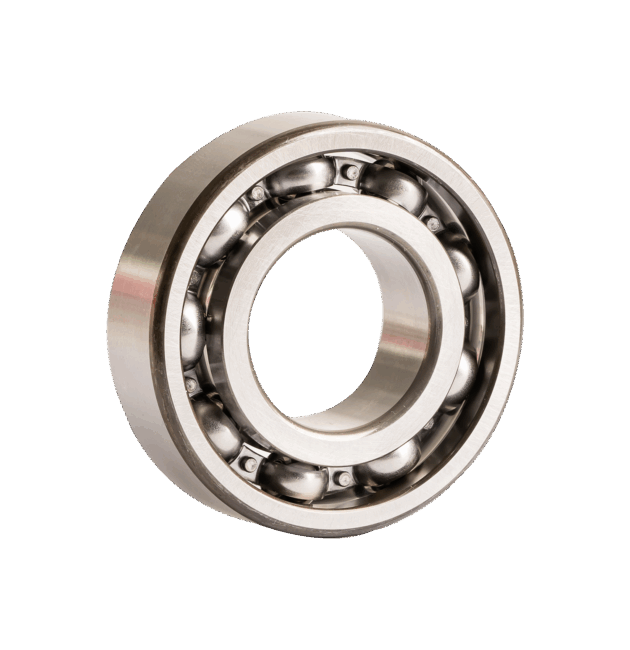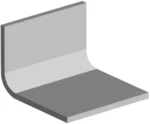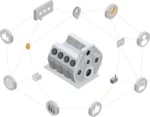Titanium
Titanium (Ti) belongs to the group of structural metals. It is a high-strength metal that is characterized by a light silver color. Titanium is characterized by its exceptional corrosion resistance and high strength. Titanium is usually extracted from the ore using the Kroll process.
Titanium is divided into two main groups: Pure titanium and titanium alloys. Pure titanium is divided into four grades, which differ primarily in terms of their mechanical properties such as strength. In the case of titanium alloys, grade 5 is particularly widespread, which impresses with its particularly high corrosion resistance due to the addition of aluminum and vanadium, for example.
Due to its special properties such as the good strength-to-density ratio, corrosion resistance and biocompatibility, titanium is used in many industries, e.g. in chemical applications as well as in medicine and aerospace. Find out more about the types of titanium and their properties in the following table.

The various Titanium types
| Material | Grades | Description | Services |
|---|---|---|---|
| EN 3.7025 | Grade 1 | The grade 1 material is a pure titanium and has numerous impressive mechanical properties. It has very good cold formability and optimum strength, particularly in relation to its density. In addition, EN 3.7025 is weldable and offers excellent ductility. Titanium grade 1 is the softest of all titanium grades. As a result, it has a lower load-bearing capacity compared to the other grades, but is highly resistant to corrosion. EN 3.7025 is particularly suitable for linings, as well as for applications that come into contact with difficult weather conditions or seawater. | Sheet Metal Processing, CNC-Machining, Casting Processes |
| EN 3.7035 | Grade 2 | Titanium grade 2 has similar properties to grade 1. It has an excellent strength to ductility ratio and very good corrosion resistance. EN 3.7035 is very resistant to seawater and can therefore be used in a wide range of industries. Possible applications include use in the manufacture of sheets, discs or pipes or in medical and maritime products. | Sheet Metal Processing, 3D, CNC-Machining, Casting Processes |
| EN 3.7055 | Grade 3 | The pure titanium grade 3 has a higher strength compared to grades 1 and 2, but the corrosion resistance does not differ. In addition, EN 3.7055 is particularly resistant in strongly oxidizing and weakly reducing environments. Similar to the other titanium grades, grade 3 also offers the advantage of low thermal expansion. This grade is used particularly in aviation or medicine and also in applications where weight has to be saved, as the grade is characterized by an excellent strength-to-density ratio. EN 3.7055 is also suitable for products such as sheets, tubes or wires. | Sheet Metal Processing, CNC-Machining |
| EN 3.7065 | Grade 4 | Titanium grade 4 is the grade with the highest hardness of the four pure titanium grades. It therefore offers excellent impact resistance and at the same time easy formability. Like the other titanium grades, EN 3.7065 has a good strength-to-density ratio. Pure titanium also impresses with its very good biocompatibility and is highly resistant to corrosion. This makes this titanium grade particularly practical for use in the chemical and medical industries, | Sheet Metal Processing, CNC-Machining, Casting Processes |
| EN 3.7165 | Grade 5 | Grade 5 titanium alloy is the most widely used in the world and is used in many industries. In contrast to the grades of pure titanium Grade 1 to 4, Grade 5 also contains approx. 6% aluminum and 4% vanadium. EN 3.7165 is hardenable up to a thickness of 25 mm and has excellent mechanical properties, such as very good ductility, strength and toughness. In addition, grade 5 has very good corrosion resistance and is therefore often used in the aerospace and medical industries. Sheets, tubes or fine components are just some of the versatile product possibilities. | Sheet Metal Processing, CNC-Machining, Casting Processes |
Titanium: Pros and Cons
Pros
Titanium is particularly characterized by the fact that even as pure titanium it already has a high corrosion resistance, especially against chlorine and seawater, which can be further improved with the appropriate alloy. In addition, the ratio of strength to density and weight is particularly impressive with a very good balance, which means that a stable product can be manufactured despite its low weight. This is particularly advantageous in industries such as aerospace. Another advantage is its excellent biocompatibility, which means that titanium is often used in the medical and chemical sectors. Furthermore, titanium has a high temperature limit, which means that it can even be used in environments with high or cold temperatures. Finally, titanium is also known for its lower thermal conductivity compared to aluminum or copper, which makes it well suited for thermal insulation.
Cons
Compared to other metals such as steel or aluminum, titanium is relatively expensive to procure. This is due to the fact that the extraction of titanium is significantly more difficult and energy-intensive. In addition, certain mechanical properties of titanium are at a disadvantage compared to other metals, such as its tendency to react with tools. This makes titanium more difficult to machine. Finally, care must be taken to observe the material limits of titanium, as the material can become brittle at extreme temperatures and thus lose stability. Galvanic corrosion in direct contact with other metals is also possible, which is why care must be taken during production.
Further Resources
Book personal meeting
Contact Us
* By submitting the form, you agree to the assemblean privacy policy.


